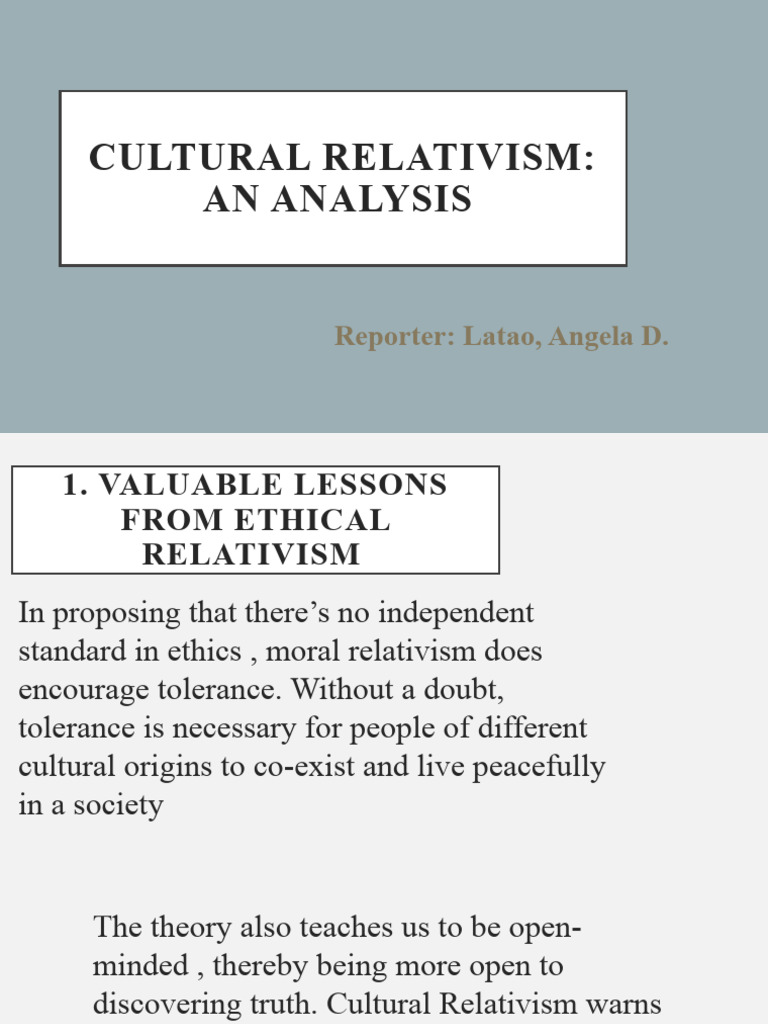Cultural relativism is an essential concept in anthropology, serving as a lens through which diverse human societies and their myriad practices can be understood. This principle posits that beliefs, values, and practices should be understood based on their cultural context rather than be adjudicated against the standards of another culture. In an increasingly interconnected world, the relevance of cultural relativism becomes ever more pronounced, as it invites critical examination of how societies interact in a globalized milieu.
To delve into the definition of cultural relativism is to embark on an exploration of its foundational principles. At its core, cultural relativism asserts that one’s understanding of morality and ethics is inextricably tied to societal norms and cultural backgrounds. Such a stance does not merely advocate for tolerance; instead, it challenges ethnocentrism—the belief that one’s own culture is superior to others. By positioning itself against such biases, cultural relativism encourages anthropologists and scholars to adopt a more nuanced perspective when assessing different cultural practices.
The birth of cultural relativism can be traced back to the early 20th century, with anthropologists like Franz Boas advocating for its principles. This tenet emerged largely in reaction to prevailing colonial attitudes, which often dismissed indigenous practices as primitive. The work of Boas and his contemporaries established the foundation for ethnographic research that prioritized understanding the internal logics of cultural systems. As such, cultural relativism embodies a methodological imperative: researchers are to engage with and interpret cultures on their own terms.
Understanding cultural relativism requires an appreciation of context. Context is multifaceted; it encompasses historical, social, economic, and political dimensions that shape communities. For instance, social rituals and belief systems are not just arbitrary behaviors, but are deeply embedded within the lived experiences of individuals and their collective histories. Cultural relativism demands anthropologists to immerse themselves in the intricacies of these contexts to grasp the significance behind various cultural phenomena.
Ethics in the realm of cultural relativism presents another layer of complexity. Ethical dilemmas often arise when cultural practices clash with universal human rights standards. Consider, for example, practices related to gender roles, marriage, or even rites of passage that, from an external viewpoint, may seem oppressive. Cultural relativism compels ethnographers to resist an immediate ethical judgment, advocating instead for an investigation into the cultural significance of these practices. This approach fosters dialogue and understanding rather than condemnation, allowing for a richer comprehension of the human experience.
Furthermore, the concept of moral pluralism arises within the framework of cultural relativism. This notion acknowledges the existence of multiple moral viewpoints and the belief that each is valid within its cultural context. The perception that moral truths are subjective can be unsettling for some, as it challenges the archetypal belief in universal rights. Yet, it is precisely this plurality that captures the fascination of anthropologists, drawing them into the myriad expressions of human existence. Understanding this moral tapestry can mitigate the potential for cultural misunderstandings and conflicts.
Nevertheless, cultural relativism is not without its critiques. Opponents argue that the acceptance of diverse cultural practices can lead to moral ambiguity, potentially excusing practices that violate individual rights. The case of female genital mutilation (FGM) is often cited as a poignant example where cultural relativism’s stance may falter in the face of advocating for fundamental human rights. Here, the delicate balance between respecting cultural practices and safeguarding individual liberties becomes a contentious battleground.
Moreover, the globalized world often demands a reevaluation of cultural relativism’s efficacy. As cultures intermingle, the clear boundaries once delineated by cultural contexts blur, thereby complicating the application of relativism. Anthropologists are increasingly tasked with understanding not only isolated cultures but also the dynamics of cultural syncretism and hybridization. This evolution highlights the necessity for a multifaceted approach to cultural understanding—one that accounts for both local identity and global influences.
In the realm of applied anthropology, cultural relativism has proved invaluable. Practitioners working in areas such as development, public health, and conflict resolution have leveraged the principles of cultural relativism to design interventions that resonate within local contexts. By valuing the perspectives of local communities, interventions are more likely to be effective and sustainable. This practical application of cultural relativism underscores its significance beyond theoretical discourse and demonstrates its relevance in addressing contemporary issues.
In conclusion, cultural relativism serves as a vital framework for anthropologists seeking to navigate the complexities of human societies. By emphasizing context and the validity of diverse ethical systems, it dismantles ethnocentric viewpoints and fosters a deeper understanding of the human experience. The balance between cultural respect and ethical considerations continues to fuel academic discourse, reflecting the ongoing evolution of this essential anthropological tenet. Ultimately, cultural relativism not only enriches academic research but also offers profound insights into living harmoniously within an increasingly multicultural world.
